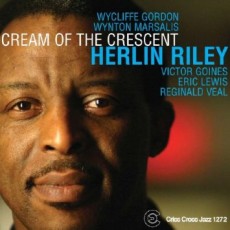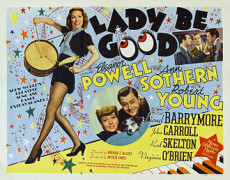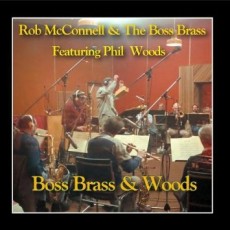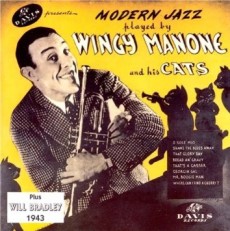
Daily Dose Of Jazz…
Herlin Riley was born February 15, 1957 in New Orleans, Louisiana into a musical family and first began playing the drums at the age of three. He studied trumpet throughout high school and for two years of college, but his interest in the instrument waned and he began to focus again on drums.
From 1984 to 1987, Riley was a member of Ahmad Jamal’s group. He then joined Wynton Marsalis in 1988, and toured and performed with the outfit until the group disbanded in 1994. He also performed music by Duke Ellington on the first Lincoln Center Jazz Orchestra U.S. tour in 1992.
He has made recordings with Marcus Roberts, Dr. John, Harry Connick Jr., George Benson, Bennie Wallace and Mark Whitfield. In addition, Herman has released two albums as a leader, and has played in theatrical performances, including One Mo’ Time and Satchmo: America’s Musical Legend. In 2010 he was honored with the Ascona Jazz Award from the Ascona Jazz Festival in Switzerland.
Whirlin’ Herman Riley, as he is affectionately known, is a regularly featured musician at Jazz at Lincoln Center, is a member of the Lincoln Center Jazz Orchestra, and played a large part in developing the drum parts for Wynton Marsalis’s Pulitzer Prize-winning Blood on the Fields. He is a lecturer in percussion for the jazz studies program at the Bienen School of Music at Northwestern University. The neo-bop drummer continues to perform, record and tour.
More Posts: drums

Hollywood On 52nd Street
Lady Be Good was performed in the 1941 film Lady Be Good, taking its title and theme song “Oh Lady Be Good” from the 1924 George and Ira Gershwin Broadway musical, but otherwise is unrelated to the musical play. The film starred dancer Eleanor Powell, Ann Sothern, Robert Young, Lionel Barrymore and Red Skelton.
The Story: Eddie Crane, a young composer, is struggling with a tune he has just written. When his girlfriend, Dixie Donegan, provides words almost by accident, the song is published and is a great success.
A few years later, now married and successful songwriters with a hit Broadway show behind them, Dixie realizes that Eddie is spending more time in rich New York society than composing. They divorce, but quickly realize they are still in love and cannot do without each other. They remarry and write more successful songs, but then Eddie goes off to South America, ostensibly to get inspiration to write a symphony. Dixie again seeks a divorce, but the astute judge denies it. Eddie returns and they realize that despite all, they are still in love.
Sponsored By
www.whatissuitetabu.com

Daily Dose Of Jazz…
Rob McConnell was born Robert Murray Gordon McConnell on February 14, 1935 in London, Ontario, Canada. He took up the valve trombone in high school and began his performing career in the early 1950s, performing and studying with Don Thompson, Bobby Gimby, Maynard Ferguson and music theory with Gordon Delamont. In 1968 he formed The Boss Brass, a big band that became his primary performing and recording unit through the Seventies and Eighties.
In 1988, McConnell took a teaching position at the Dick Grove School of Music in California, but gave up his position and returned to Canada a year later. In 1997, he was inducted into the Canadian Music Hall of Fame and in 1998 was made an Officer of the Order of Canada.
Rob remained active throughout the 2000s, touring internationally as both a performer and educator. The Rob McConnell Tentet, a scaled-down version of the Boss Brass featuring many Boss Brass alumni, has been quite successful; it has recorded three major albums, The Rob McConnell Tentet, Thank You, Ted and Music of the Twenties.
Rob McConnell & The Boss Brass became one of Canada’s most popular jazz ensembles, performing live and recording for Concord Jazz label and a variety of others. The valve trombonist, composer, arranger, bandleader, educator and recording artist died on May 1, 2010 in Toronto, Ontario, aged 75, from cancer. He left a catalogue of 33 albums recording with Maynard Ferguson and Mel Torme among others.
More Posts: trombone

Daily Dose Of Jazz…
Wingy Manone was born Joseph Matthews Manone on February 13, 1900 in New Orleans, Louisiana. He lost an arm in a streetcar accident, which resulted in his nickname of “Wingy”. He used prosthesis so naturally and unnoticeably that his disability was not apparent to the public.
After playing trumpet and cornet professionally with various bands in his hometown, Manone began to travel across America in the 1920s, working in Chicago, New York City, Texas, Mobile, California, St. Louis and other locations; he continued to travel widely throughout the United States and Canada for decades.
Wingy’s was a frequently recruited musician for recording sessions. He played and recorded with Benny Goodman and recorded fronting various pickup groups under pseudonyms like “The Cellar Boys” and “Barbecue Joe and His Hot Dogs.” His hit records included “Tar Paper Stomp” was later used as the basis for Glenn Miller’s “In The Mood” and a hot 1934 version of a sweet ballad of the time “The Isle of Capri”.
In 1943 he recorded several tunes as “Wingy Manone and His Cats”, performed in Soundies movie musicals and his autobiography, Trumpet on the Wing, was published in 1948. From the 1950s he was based mostly in California and Las Vegas, although he also toured through North America and Europe appearing at jazz festivals. In 1957, he attempted to break into the teenage rock-and-roll market with his version of Party Doll but never rose higher than 56 on the Billboard pop charts.
He composed numerous songs and in 2008, “There’ll Come a Time (Wait and See)” was used in the soundtrack to the Academy Award-nominated movie The Curious Case of Benjamin Button. Trumpeter, vocalist, composer and bandleader Wingy Manone remained active until his passing on July 9, 1982 in Las Vegas at the age of 82.
More Posts: trumpet

Daily Dose Of Jazz…
Brent Jensen was born on February 12, 1960 in Boise, Idaho. By 1986 on a grant from the Idaho Commission on the Arts he was studying in New York City with Lee Konitz.
Throughout his career Brent has performed with jazz artists including Gene Harris, Bobby Shew, Gary Foster, Dave Peck, Joe LaBarbera, John Clayton, Wycliffe Gordon, Warren Vache, Curtis Stigers, John Stowell, Kristin Korb, Jamie Findlay, Duck Baker, Dianne Schuur and many others.
Jensen has charted to #1 with his debut recording, The Sound of a Dry Martini: Remembering Paul Desmond, and Stay Cool, his sophomore release both on Origin Records. By his fifth CD for Origin, One More Mile he teamed up with Seattle musicians, pianist Bill Anschell, bassist Jeff Johnson and drummer John Bishop. This he followed in 2009 with the release of We Couldn’t Agree More is a collection of duets with Seattle pianist Bill Anschell.
He would go on to be a featured winner of the Woodwinds on Fire international talent search conducted by Jazziz magazine in 1996. Soprano saxophonist Brent Jensen is an Assistant Professor of Music at the College of Southern Idaho in Twin Falls, is the Artistic Director for the CSI Jazz Summit and the Jazz Saturdays workshop series.
More Posts: saxophone



